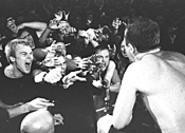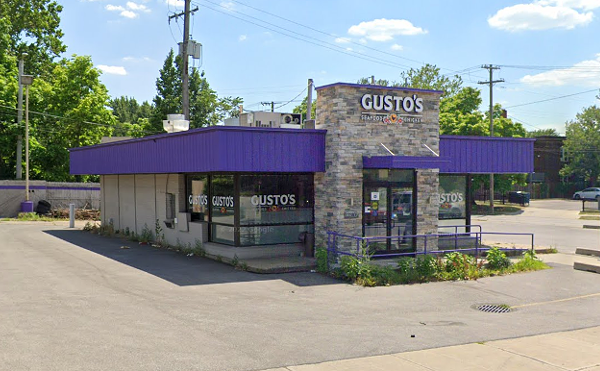What began as a promotional film intended to document the making of St. Anger, released last year, ended up as one of the greatest rock documentaries ever made, up there with D.A. Pennebaker's Dylan film Dont Look Back, Al and David Maysles's Altamont autopsy Gimme Shelter, and Robert Frank's drugged-out Stones film Cocksucker Blues -- all invaluable backstage-pass peeks at rock stars withering when they're out of the spotlight's glare. Some Kind of Monster shrinks the arena-sized images of singer-guitarist James Hetfield, drummer Lars Ulrich, and guitarist Kirk Hammett into life-sized portraits of average men overwhelmed by the "beast" of their own creation; at times, you wonder why these 40-year-olds are even in this band, when its mere existence seems destined to ruin their lives (save perhaps Hammett, who's as grounded as dirt compared to his tightly wound mates). Hence the reason the band enters group therapy, of which we see perhaps too much; never again will you listen to a Metallica album without wanting to give growlin' James Hetfield a reassuring hug.
The movie opens with the band moving into the Presidio, the old military base in San Francisco where they will begin recording their eighth studio album. It's 2001, nearly four years after the release of Re-load, and the band's in shit shape: Bassist Jason Newsted has quit to play with his quasi-funk-rock trio Echobrain, and Ulrich's campaign against Napster has alienated even some of the band's biggest fans. They figure that the Presidio, with its peeling paint and ghost-town vibe, will revitalize the band -- "make it sound like a band playing in a garage," says producer Bob Rock, also filling in on bass, "except that band's Metallica." For the first time, and at the suggestion of therapist Phil Towle (helpful to the point of becoming overbearing), Ulrich and Hammett have been invited to write lyrics as well; the intention is to make Metallica a singular unit moving in the same direction, rather than three guys falling away from each other.
It works for a while -- "It's so awesome," says Michael Keaton look-alike Ulrich -- but crumbles quickly, just 44 days into recording. Hetfield disappears, first to Russia, where he drinks vodka like water and kills bears for sport, and then into rehab. Initially he's going to be gone for six months, which stretches well past a year. And when he does return, with the band recording in a new studio, he has all kinds of guidelines, including the mandate that he can work only from noon to 4 p.m. every day. That infuriates Ulrich, who finally explodes on his old friend with a torrent of fuckfuckfuuuuuucks that stings with decades' worth of pent-up frustrations. You begin to wonder not only if Metallica will remain together, but why it even bothers -- save for the "squillions of dollars" the band rakes in, as Hetfield puts it. The friendship that became a partnership appears to have devolved into an abusive relationship, to the point that Ulrich seems to take pleasure in drinking booze around his newly sober bandmate.
It's during Hetfield's rehab stint that some of the most mesmerizing and heartbreaking things occur. At the therapist's insistence, Ulrich meets with Dave Mustaine, who was ousted from the band in the early 1980s before he could self-destruct and take the band with him. The Megadeth frontman, a heap of red hair and real regret, tells the drummer he'd "give anything for that chance" to go back to 1982 and repair his relationship with his "little Danish friend." Part of you wants to laugh at his self-pity; he was in Megadeth, for Christ's sake. But you're also forced to recognize how badly he was treated back then, when Hetfield and Ulrich and the late bassist Cliff Burton were just kids more concerned with making it than with helping a friend get clean. But it's as Hetfield says when talking about Newsted's departure, which Hetfield expedited by refusing to allow him to participate in a side project: "The way I learn how to love things is to choke 'em to death." That he, and his band, still lives is astonishing enough; that you get to see how and why in a movie so painfully intimate is nothing short of extraordinary.










